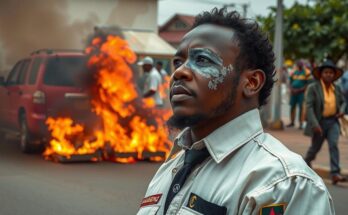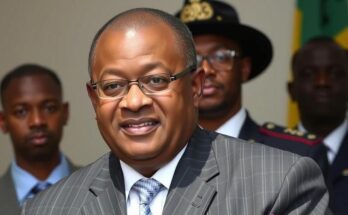Young Ghanaian voters are pinning their hopes for economic relief on the upcoming presidential election, yet they face limited options, primarily between Vice President Mahamudu Bawumia and former President John Mahama. The election reflects widespread dissatisfaction with the current government’s performance amid serious economic issues, including a rising cost of living and unemployment. Allegations of potential electoral fraud further heighten concerns about the electoral integrity in a region where democracy is in jeopardy.
In Ghana, young voters are expressing a desire for political change through their upcoming presidential vote, viewing it as a potential solution to their socioeconomic struggles. Among the 18.7 million registered voters, many, like trader Joseph Antwi, are frustrated with the current government’s failure to fulfill promises. The focus of the election is largely between two main candidates: the ruling party’s Vice President Mahamudu Bawumia and former President John Mahama from the opposition. The former pledges to stabilize the economy while the latter aims to “reset” governance and services in the country.
Despite the array of candidates, the election is anticipated to be a competitive two-horse race. With Ghana experiencing a significant cost-of-living crisis, coupled with mounting unemployment and issues such as illegal gold mining, voters are eager for a leader who can effectively address these challenges. As the campaign intensifies and rallies gain momentum, concerns over electoral integrity and potential rigging by the ruling party have surfaced, reflecting the broader apprehensions about democratic governance in West Africa. The electoral commission assures the public of its commitment to transparency and fair processes as the country prepares for a decisive election.
The political landscape in Ghana is characterized by a two-party system, with past elections typically dominated by the National Democratic Congress (NDC) and the New Patriotic Party (NPP). Currently, Ghana faces severe economic challenges, including high inflation, a depreciating currency, and significant public debt, further exacerbated by the realities of illegal mining activities. Young citizens and first-time voters are increasingly vocal about their dissatisfaction with current governance, seeking a candidate who can deliver tangible improvements to their living conditions. In this charged environment, the election is not merely a political exercise but a crucial juncture for the nation’s youth, who view it as an opportunity for a fresh start and a means to alleviate their hardships.
The upcoming presidential elections in Ghana represent a critical moment for young voters who are deeply concerned about their socioeconomic prospects. With key issues including economic instability, unemployment, and governance under scrutiny, candidates must navigate a complex political landscape while offering clear solutions to pressing challenges. As tensions mount and debates intensify, the integrity of the electoral process will be pivotal in shaping the future of Ghanaian democracy.
Original Source: apnews.com




